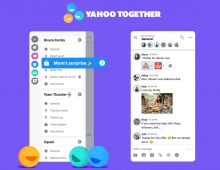
Yahoo Seeks to Change Search, Web Browsing With Axis
Yahoo! today launched Yahoo! Axis, a new mobile browser
and desktop plug-in that gives users visual search
results as they type.
Axis can be downloaded as a standalone mobile browser for Apple iOS
devices, and for major HTML5 enabled desktop browsers (Firefox 7+, Safari v5+, Internet Explorer 9 and all versions of Chrome),
as a desktop plug-in.
Yahoo! Axis comes equipped with handy features that unify searching and browsing. For example, Yahoo!'s one-step search lets users preview and interact with visual search results without leaving the page they?re on. And instant answers show the information users want as they type common searches like finding movie times, sports scores, stock prices and more.

Axis also includes a personalized home page that contains users' most recently visited sites, bookmarks and articles they plan to read later. This personalized home page stays with users across theirdesktop, iPad and iPhone, keeping what's important to them in a centralized spot. Users can pick up where they left off when they switch devices.
Axis even has a few bonus features for iPhone and iPad users, like simple swiping to quickly get from one search result to the next, a bar that combines the search box and address bars into one, and sharing so users can easily post any page they are viewing to Twitter or Pinterest.
Axis is built upon the Yahoo! 'Cocktails' mobile development platform. Comprised of 'Mojito', an open source JavaScript MVC framework and 'Manhattan', a cloud-based hosted environment, 'Cocktails' is a blend of open, standard web technologies including HTML5, CSS3, JavaScript and Node.JS.
Yahoo won't show ads next to Axis search results initially, but the company believes the visual format will be ideal for video commercials and graphical marketing.
Two weeks ago, Microsoft previewed an upcoming change that will spread Bing's search results in three columns, including one devoted to personalized recommendations pulled from Facebook, Twitter and other social networking services.
Last week, Google unveiled a new search feature called a "Knowledge Graph" that seeks to provide more immediate answers by highlighting information from a database containing more than 500 million entries about people, places and other commonly requested things.
Yahoo is trying to everse its declining share of the Internet's search market and bring it more traffic from among the growing number of smartphone and tablet users.
Yahoo! Axis comes equipped with handy features that unify searching and browsing. For example, Yahoo!'s one-step search lets users preview and interact with visual search results without leaving the page they?re on. And instant answers show the information users want as they type common searches like finding movie times, sports scores, stock prices and more.

Axis also includes a personalized home page that contains users' most recently visited sites, bookmarks and articles they plan to read later. This personalized home page stays with users across theirdesktop, iPad and iPhone, keeping what's important to them in a centralized spot. Users can pick up where they left off when they switch devices.
Axis even has a few bonus features for iPhone and iPad users, like simple swiping to quickly get from one search result to the next, a bar that combines the search box and address bars into one, and sharing so users can easily post any page they are viewing to Twitter or Pinterest.
Axis is built upon the Yahoo! 'Cocktails' mobile development platform. Comprised of 'Mojito', an open source JavaScript MVC framework and 'Manhattan', a cloud-based hosted environment, 'Cocktails' is a blend of open, standard web technologies including HTML5, CSS3, JavaScript and Node.JS.
Yahoo won't show ads next to Axis search results initially, but the company believes the visual format will be ideal for video commercials and graphical marketing.
Two weeks ago, Microsoft previewed an upcoming change that will spread Bing's search results in three columns, including one devoted to personalized recommendations pulled from Facebook, Twitter and other social networking services.
Last week, Google unveiled a new search feature called a "Knowledge Graph" that seeks to provide more immediate answers by highlighting information from a database containing more than 500 million entries about people, places and other commonly requested things.
Yahoo is trying to everse its declining share of the Internet's search market and bring it more traffic from among the growing number of smartphone and tablet users.





















